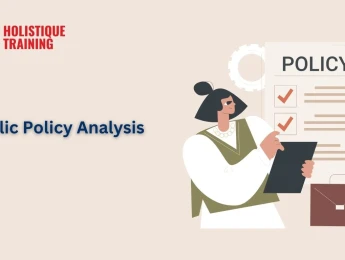Public policy analysis examines and evaluates government policies to determine their effectiveness, efficiency, and potential impact on society. This course is designed to provide participants with a comprehensive understanding of assessing, developing, and recommending policies based on data-driven research, stakeholder input, and societal needs. In today’s complex political and social environment, effective policy analysis ensures that public decisions lead to positive, equitable outcomes.
The course will cover key aspects of policy analysis, including identifying policy problems, setting objectives, evaluating alternatives, and making recommendations. Participants will learn to use qualitative and quantitative data to assess policy options, balance competing interests, and propose solutions addressing social, economic, and environmental concerns. The course also includes tools and frameworks for measuring the effectiveness of existing policies and adjusting them based on feedback and changing circumstances.
Through real-world case studies and practical applications, participants will learn to evaluate public policies critically, influence decision-making, and contribute to more informed, evidence-based policy creation. This course suits professionals working in government, non-profit organisations, advocacy groups, or any field where policy analysis is key in achieving organisational or societal goals.
Upon completion of this course, participants will be able to:
- Understand the fundamentals of public policy analysis and its importance in governance.
- Learn to identify and define policy problems and objectives clearly.
- Gain skills in using qualitative and quantitative data to assess policy alternatives.
- Develop techniques for evaluating policies' social, economic, and environmental impacts.
- Learn to make informed policy recommendations based on evidence and stakeholder input.
- Understand how to monitor and measure the effectiveness of policies over time.
This course is designed for:
- Government Officials and Policy Makers : Individuals involved in designing, implementing, and evaluating public policies at various levels of government.
- Non-Profit and Advocacy Professionals : Those working in organisations focused on influencing public policy and advocating for social, environmental, or economic change.
- Researchers and Academics : Individuals engaged in research related to public policy analysis or advising policymakers on evidence-based decisions.
- Business Leaders and Consultants : Professionals who interact with government policies or need to understand their impact on industries, markets, and the economy.
- Students and Aspiring Policy Analysts : Individuals pursuing careers in public policy, governance, or related fields.
This course will utilise a variety of teaching methods to engage participants and ensure they acquire both the theoretical and practical skills needed for effective policy analysis:
- Instructor-Led Presentations : Experts will provide lectures on the core principles of public policy analysis, including key frameworks and methods.
- Workshops and Group Discussions : Participants will engage in collaborative workshops to analyse policy issues, evaluate alternatives, and develop recommendations.
- Case Study Analysis : Real-world case studies will illustrate how policies are developed, analysed, and adjusted in practice, allowing participants to apply theoretical knowledge to actual policy situations.
- Data Analysis Exercises : Participants will work with real data to practice assessing policy alternatives using quantitative and qualitative research methods.
- Policy Report Writing : Participants will learn how to structure and present policy recommendations clearly and persuasively.
- Role-Playing and Simulations : Participants will act as policymakers or analysts in simulated policy scenarios to practice decision-making under pressure.
- Assessments and Feedback : Periodic assessments will test participants’ understanding of key concepts, while feedback will be provided to guide improvement.
Day 5 of each course is reserved for a Q&A session, which may occur off-site. For 10-day courses, this also applies to day 10
Section 1: Introduction to Public Policy Analysis
- Definition and Importance of Public Policy
- The Policy-Making Process: From Problem Identification to Implementation
- The Role of Policy Analysts in Decision-Making
Section 2: Identifying and Defining Policy Problems
- How to Recognise Public Policy Issues
- Setting Clear Objectives and Defining the Scope of Policy Analysis
- Understanding Stakeholder Needs and Interests
Section 3: Policy Research and Data Collection
- Qualitative and Quantitative Research Methods in Policy Analysis
- Data Sources: Government Reports, Surveys, and Public Records
- Collecting and Interpreting Data for Policy Decision-Making
Section 4: Evaluating Policy Alternatives
- Frameworks for Evaluating Policy Options
- Criteria for Assessing Effectiveness, Efficiency, and Equity
- Cost-Benefit Analysis and Risk Assessment
Section 5: Making Policy Recommendations
- Structuring Policy Proposals and Reports
- Communicating Recommendations to Policymakers and Stakeholders
- Balancing Competing Interests and Ethical Considerations
Section 6: Monitoring and Measuring Policy Impact
- Tools and Techniques for Evaluating Policy Outcomes
- Using Feedback to Adjust and Improve Policies
- Long-Term Monitoring and Accountability Mechanisms
Section 7: Public Policy and Governance
- The Relationship Between Public Policy and Governance
- The Role of Advocacy, Media, and Public Opinion in Shaping Policy
- Case Studies: Successes and Failures in Public Policy Implementation
Section 8: Case Studies and Practical Applications
- Real-World Examples of Policy Analysis in Action
- Lessons from Policies on Healthcare, Education, and Environmental Issues
- Developing and Presenting a Policy Analysis Project
Upon successful completion of this training course, delegates will be awarded a Holistique Training Certificate of Completion. For those who attend and complete the online training course, a Holistique Training e-Certificate will be provided.
Holistique Training Certificates are accredited by the British Assessment Council (BAC) and The CPD Certification Service (CPD), and are certified under ISO 9001, ISO 21001, and ISO 29993 standards.
CPD credits for this course are granted by our Certificates and will be reflected on the Holistique Training Certificate of Completion. In accordance with the standards of The CPD Certification Service, one CPD credit is awarded per hour of course attendance. A maximum of 50 CPD credits can be claimed for any single course we currently offer.
Categories
Government and NGOs,- Course Code IND17 - 110
- Course Format Classroom, Online,
- Duration 5 days













